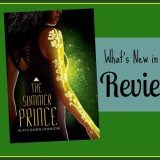
The Summer Prince by Alaya Dawn Johnson
Positives
Negatives
The Summer Prince by Alaya Dawn Johnson is set in futuristic Brazil, in the coastal city of Palmares Três. Palmares Três is a matriarchal society, ruled by a queen and governed by a body of women known as Aunties. A new king is elected by the people every year. Every fifth year, the king is killed in sacrifice to the city, and his final gesture is to mark the next queen in blood as he takes his final breaths.
June Costa is the best artist in Palmares Três. She and her best friend, Gil, live in one of the top levels of the pyramid-shaped city, enjoying the life of the privileged class. It is this privilege that allows them both to meet Enki, the newest Summer King, who has exactly 365 days to live until his chosen sacrifice. Enki comes from the Verde, the bottom level of the city, and he has the soul of an artist. He and Gil fall deeply in love, but Enki’s relationship with June becomes far more complicated. They are both passionate artists with a political agenda. June is competing for the Queen’s Award, and with Enki’s help she believes she can make her mark on Palmares Três before Enki is killed and the competition ends.
The Summer Prince is a YA novel that doesn’t read like YA. Johnson’s writing gleams with sophistication and nuance. She shows rather than tells, which may frustrate those who prefer the more literal wording of most adolescent literature. What truly stands out in Johnson’s tale is her descriptions of dystopian Palmares Três. The city becomes a character in this novel, with almost equal parts hot, sticky Brazilian bassa nova and rusty, mechanical technology. This combination is unique, and the city is alive on every page. It is rare to see a dystopian novel that’s not set in America or Europe. Johnson even explains how the future has affected other famous world cities. For example, there are ten Tokyos where citizens exist as personalities downloaded onto computers. The imagination in the world-building is incredible.
The society of Palmares Três is also unique in young adult literature for its treatment of women. Palmares Três is a matriarchal society because the war that caused the city to crumble is blamed on men. Women are perceived as more capable of making decisions, running the country, and protecting the streets. Society has evolved to be more accepting of sexuality. Most of the characters are bisexual or pansexual, and sex is not taboo for teenagers. The sexual and romantic dynamic between the characters is quite fluid. However, it is clear that a society of primarily female leadership is not perfect, either. There is still corruption in the government. Secrets are kept and the decisions made are not always in the best interest of the city. June is given access to this information through her relationship with her step-mother (an Auntie), Enki, and her conversations with the Queen during the contest for the Queen’s award.
Much in this story is innovative and intriguing, and I enjoyed the world-building in Palmares Três. The one complaint I have about this story is that our protagonist, June, does not live up to the expectations set by the other elements of the novel. June’s intentions are not always clear and they don’t always make sense. As a reader, I felt very disconnected from her thoughts and emotions. I’m not sure that this distance was intentional. Was I supposed to be rooting for her in the Queen’s award contest? Was I supposed to be rooting for her friendship with Gil? Her artistic romance with Enki? Her relationship with her mother? Grasping the true conflict of the story was difficult. In the end, I think this is the reason why the novel felt more like adult literary fiction than young adult literature – and I think that’s a good thing. YA needs more areas of gray. More unlikeable narrators. More surprises.
The Summer Prince is an excellent addition to best-of lists for 2013. I applaud the book for including people of color, a fascinating culture, fluid sexualities, and a female-governed society. This is a novel for those who want to explore mature themes in young adult literature, though I’m having difficulty picturing the teenager who would actually enjoy the story outside of a classroom environment. It’s an interesting, relatively quick read and definitely worth checking out if you are trying to read through this year’s Printz contenders before the award announcements on January 28!
I’m considering The Summer Prince to be a Printz contender, and my reviews this winter will cover other books that represent the best of 2013. Have you read Rose Under Fire, Eleanor & Park, Winger, or any more of 2013’s best? Share your thoughts in the comments!


